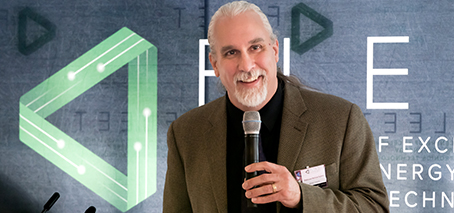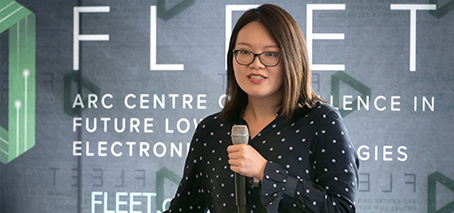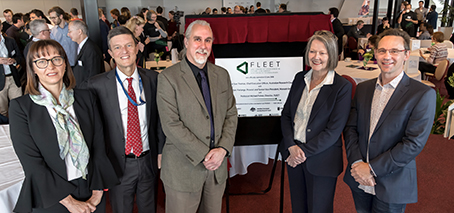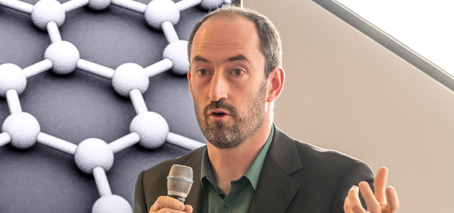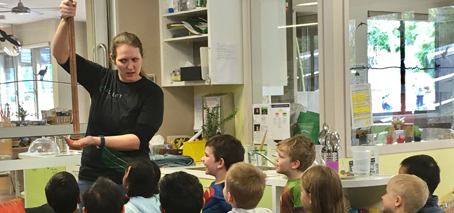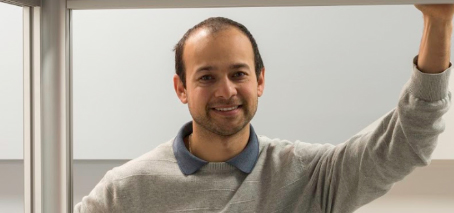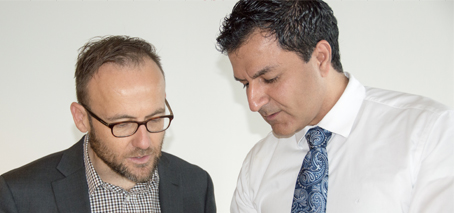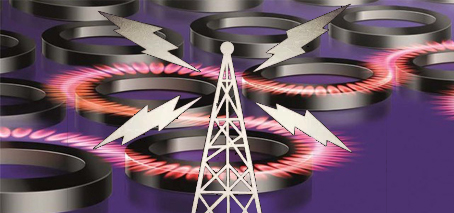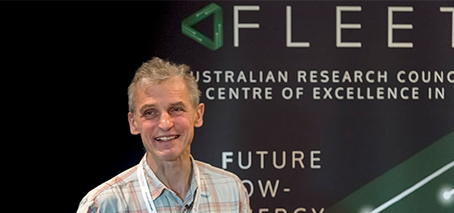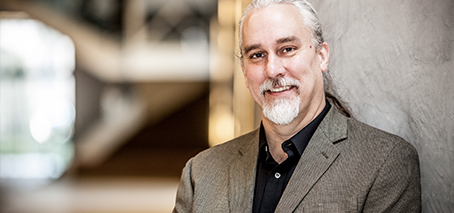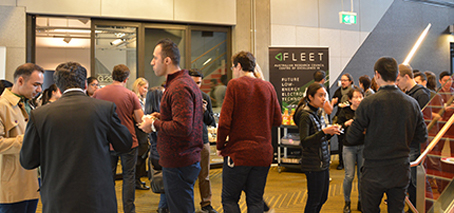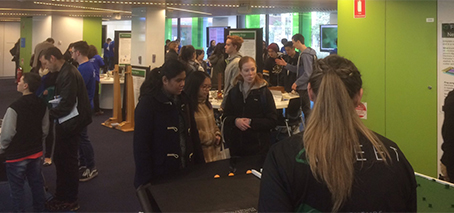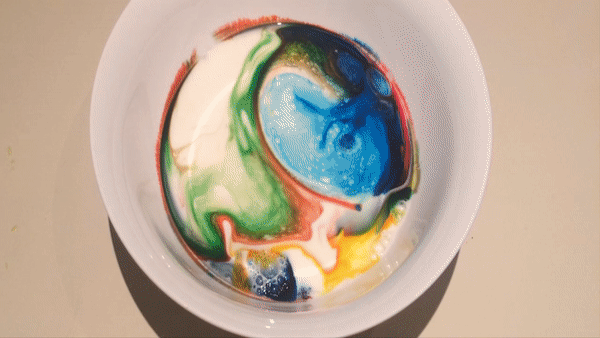The challenge of finding a sustainable path to continuing the IT revolution is critical, and time is running out. I can tell you today with reasonable certainty that Moore’s Law will be declared dead within the seven-year operation of the Centre–perhaps even before our mid-term review! Computer chips will cease to gain in efficiency, and yet our demand for computation …
The case for FLEET: 8% of global electricity now consumed by computing
The information technology revolution has improved our lives, and we want it to continue. For example, our smartphone has become one of the most important devices of our everyday life: we use it to access up-to-date weather predictions, to plot the best route through traffic, and to watch the new series of House of Cards. And we expect it be …
Launch of FLEET Centre of Excellence to tackle hidden energy costs of computing
Official launch: Australian Research Council Centre of Excellence in Future Low-Energy Electronics Technologies 12 June 2018, 11 AM New Horizons Building, Monash University, Clayton We have an insatiable appetite for computing. But our ongoing need for computation is burning more than 5 percent of global electricity. And that figure is expected to double each decade. A new Australian Research Council …
The innovative science behind FLEET: Jared Cole at the Centre Launch
When using an electronic device to watch tv, listen to music, model the weather or any other task that requires information to be processes, there are millions and millions of binary calculations going on in the background. There are zeros and ones being flipped, added, multiplied and divided at incredible speeds. The fact that a microprocessor can perform these calculations …
Macro-chips and electronic card games: challenging students
Fresh minds develop hands-on learning methods for schools FLEET is developing innovative ways to communicate physics to school students. A collaboration with Monash University Science allowed the Centre to enlist fresh brains to this communications challenge. A team of maths and physics students from Monash Bachelor of Science–Global Challenges took on the task of developing hands-on games and resources to demonstrate …
Agustin describes atomic-scale materials engineering on RRR
FLEET Chief Investigator Agustin Schiffrin spoke on science show Einstein a Go-Go about experimental physics at the atomic scale, and the study of exciting new nanomaterials with tailored electronic properties. Listen Agustin researches new nanomaterials with novel and exotic electronic properties, constructed of organic (carbon-based) molecules, sometimes inspired by bio-organisms. The team studies topological materials, which display a range of fascinating, …
Sharing a passion for science: outreach to schools
FLEET shares the responsibility to support students and teachers to increase participation in science, and in particular works towards increasing the number of girls and women participating in physics, chemistry and engineering. The Centre Launch on 12 June will showcase FLEET’s science outreach programs, educating the public and inspiring a new generation of scientists. Home Science and FLEET Geeks programs …
Carlos talks ultra-cold atoms and inspiring schoolkids to do science, RRR
FLEET postdoc Dr Carlos Kuhn described his field of ultra-cold atomic science and the fundamental discoveries made in an interview with RRR science show Einstein a Go-Go. The research will take a huge step forward this year with the commissioning of a new ARC-funded quantum-gas microscope, which will bridge the microscopic (atomic) and macroscopic (visible) worlds. Carlos also described his …
Rebecca Orrell-Trigg (RMIT) interview re liquid metal and 2D materials, RRR
FLEET PhD student Rebecca Orrell-Trigg (RMIT) uses liquid metals to synthesise 2D (atomically thin) materials for use in future ultra-low energy electronic devices. Late last year they developed a liquid metal “bubbling” method that was described as “ground breaking”, and have since refined this method to make it even more widely applicable. Rebecca’s interview covered the advantages of the new …
Building members’ outreach skills: 2018 Melbourne Knowledge Week
Melbourne Knowledge Week (May 2018) was an opportunity for FLEET to engage with the public and road-test a number of outreach demonstrations being developed for schools. It also gave 20 Centre members the opportunity to gain valuable experience in public science outreach, speaking to a diverse audience. Melbourne Knowledge Week showcases cool science and engineering projects in the city of …
Melbourne MP Adam Bandt visiting FLEET RMIT
An MP visit last week provided an opportunity to discuss future electronics, 2D materials and science policy. Melbourne MP and Greens Science/Energy spokesperson Adam Bandt was visiting FLEET’s labs at RMIT, hosted by FLEET RMIT node leader Kourosh Kalantar-Zadeh, and FLEET Director Michael Fuhrer. As well as FLEET researchers, Adam also got to meet our scientific counterparts from the Centre for …
Torben talks liquid metal with Subatomic, Radio Adelaide
“It’s so simple my retired parents could do this in their kitchen.” FLEET AI Torben Daeneke discussed deceptively-simple methods of depositing atomically-thin materials with Rohan Neagle, on Radio Adelaide’s Subatomic radio show. Torben’s interview also covered why 2D materials are key to ultra-low energy electronics, the mechanics of 2D deposition, the end of Moore’s Law and the massive amount of …
Micro branding: creating microscale and nanoscale FLEET banners
FLEET researchers taking an innovative, even ‘playful’, approach to their science have created a couple of unique and interesting branding displays for the Centre. >>>FLEET PhD student Fan Ji developed this micro-sized logo (right) at UNSW. The FLEET logo is etched onto the two-dimensional interface between two materials, in letters only a few thousandths of a millimetre high, using bias-assisted …
Michael Fuhrer talks more-accessible physics and better transistors on radio 2CC
FLEET Director Michael Fuhrer spoke Friday with ABC Radio 2CC Canberra’s Rod Henshaw about making physics more accessible, and FLEET’s search for better, ultra-low-energy transistors. Listen Prof Fuhrer was in Canberra for the International Physics Summer School on Topological Matter at ANU. Fuhrer discussed energy use in information and communications technology (ICT) and the alternatives that FLEET is pursuing, …
Communications Training: When a Picture is Worth 1000 Words
Lyndal Byford of the Australian Science Media Centre presented to HDR students and early career researchers at Monash University on communication. She presented on the value of video and how to use a mobile phone to create quality video that can be used by media. You can find a pdf of the slides here. For the full presentation, including videos, …
Research centres share best practice
Sharing best practice, finding efficiencies, setting up future networks – and swapping a few war stories Operations staff from 18 ARC-funded centres met in Melbourne last week to share best practice and learnings, and to develop future networks among similar roles. How do centres become ‘greater than the sum of the parts’? What strategies have professional staff found to enhance …
Launching FLEET Geeks: taking science to schools
Reaching schoolkids, and setting scientists up for outreach success Bringing practising scientists to schools brings enormous benefits. The FLEET Geeks program sees FLEET members performing science shows at primary schools and kindergartens, demonstrating physics with equipment not typically available to students. The program brings scientists to the students, allowing them to ask questions about scientific phenomena seen in the show, …
Ultracold science and benefits of a changeable career in science: Wolfgang Ketterle
Physics experiments at temperatures a billionth of outer space, and the benefits of flexibility in a science career. Nobel physics laureate Prof Wolfgang Ketterle told a crowd of around 200 at Swinburne University of Technology last week about Bose-Einstein condensates (BECs), and other strange states of matter that exist at nano-Kelvin temperatures, which open a new door to the quantum …
Science Says! and other outreach collaborations
FLEET supported the first Melbourne show of Science Says!, a science entertainment event run by The Science Nation, with FLEET’s A/Prof Meera Parish (Monash University) and Prof Chris Vale (Swinburne University of Technology) appearing on the panel at the Royal Society of Victoria. FLEET collaborated with Swinburne University of Technology, Monash University School of Physics and Astronomy, and the Australian …
Wolfgang Ketterle introduces Red to new states: ABC Radio Melbourne
“That’s not right!” Well, yes, it is. Prof Wolfgang Ketterle, in Australia with FLEET, teaches ABC Radio Melbourne’s Red Symons a thing or two about states of matter. In particular, Bose Einstein condensates. Listen below. Ketterle, in town for FLEET’s inaugural annual workshop in Torquay, is visiting the ultra-cold atomic labs at Swinburne today, where FLEET researchers use Bose-Einstein condensates …
FLEET hosts physicists tour at Monash
FLEET’s Monash labs recently hosted a tour by members of the Victorian branch of the Australian Institute of Physics, the country’s leading body for physics advocacy and support. The tour included the experimental laboratories of FLEET Chief Investigators Michael Fuhrer, Agustin Schiffrin, Kris Helmerson and Qiaoliang Bao. Members saw where: Michael Fuhrer grows atomically-thin (2D) materials in the lab using …
Michael Fuhrer’s STEM Talk
As part of National Science Week 2017, Prof. Michael Fuhrer participated in STEM Talks, organised by the Faculty of Education at Monash University, where he discussed his research on topological insulators, which won the 2016 Nobel Prize for Physics. The full talk (see the link below) covers the energy used in computation, now around 5% of global electricity, as well …
When freezing cold isn’t cold enough, and lunch with a laureate
Public talk 30 November All are welcome to a public talk at Swinburne University of Technology (Hawthorn) at 7PM on Thursday 30 November. Prof Ketterle will discuss Bose-Einstein condensates, in which atoms are cooled to temperatures a billion times colder than outer space, and matter behaves as a wave, “marching in quantum lockstep”. These forms of ultra-low temperature matter, …
Got a PhD? What’s next?
Where can your PhD take you? And how can you maximise your potential future? A group of STEM PhDs and higher degree researchers heard about career options post-PhD at a forum last month, run by FLEET at Monash University. The assembled panel of academics, entrepreneurs, business development and research managers shared their own diverse career journeys and top tips on …
UNSW presents FLEET
The University of New South Wales has presented FLEET to the public as part of their Open Day. Sydney turned on some beautiful weather, as FLEET staff and students explained topological insulators to prospective students and their families, and demonstrated the isolation of atomically thin materials using graphite and molybdenum disulfide.
National Science Week – FLEET Physics Show
As part of National Science Week, FLEET’s Education & Training Coordinator visited a local kindergarten and primary school to perform a FLEET Geeks Physics Show. Dr. Dianne Ruka wowed the students, demonstrating a variety of physics concepts, including motion, forces, angular momentum and static electricity. Many of these demonstrations were performed as ‘magic tricks’, though Dianne explained that magic is …
Michael Fuhrer talks low-energy electronics on Radio 3RRR
FLEET Director Michael Fuhrer spoke today with science show Einstein a gogo on 3RRR about energy use in information and communications technology (ICT), limits to our ability to squeeze more efficiency out of traditional silicon-based technologies, and the alternatives that FLEET is pursuing, including topological materials and atomically-thin materials. Listen
FLEET Geeks
National Science Week is almost here and the team from FLEET will be visiting some local schools to put on a physics show. Students will be treated to a range of different physics activities and will have the opportunity to participate and learn more about the unseen forces all around them.
Monash Open Day introduces FLEET to students and public
Monash University’s recent open day provided a great opportunity to explain FLEET to a large audience. The FLEET zone in the School of Physics and Astronomy area allowed for hands-on demonstrations, while lab tours provided a closer look at the research and FLEET director Michael Fuhrer presented a talk on the big picture challenges of energy use in global computing. …
Launching home science activities
FLEET aims to make science more accessible to the wider community, and to bring science to kids who will become Australia’s future great scientists and engineers. So today, we’re launching a new program of home science activities for kids. FLEET will provide ideas for fun science activities and experiments that are easy to do in the home. Our first three …

